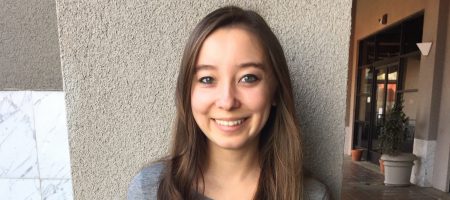Student Spotlight – Julia Nakamura
Meet fourth-year UCLA student researcher Julia Nakamura!
Julia majors in Psychobiology with a minor in Gerontology and is in our Undergraduate Research Scholars Program. The title of her research project is “The Role of Social Support in the Association between Early Life Stress, Depression, and Inflammation in Older Adults.”
How did you first get interested in your research project?
UCLA’s Cluster course “Frontiers in Human Aging” initially sparked my interest in aging populations. Through a service learning project at ONEgeneration Adult Day Care Center, I directly witnessed the burden of chronic disease in later-life adults and realized the pressing need to understand the mechanisms underlying these adverse health outcomes. Through my coursework in psychology, I became interested in the psychological factors that influence biological mechanisms and have the potential to positively impact the trajectory of chronic disease outcomes.
I began research in psychology in Dr. Julienne Bower’s Mind-Body Lab under the direction of Dr. Kate Kuhlman. We study the effects of childhood adversity on biological and behavioral responses to psychological stress. My experiences in this lab led me to wonder what factors could mitigate adverse physical and mental health outcomes from stressful experiences, specifically in older adults. My honors research projects examines if social support moderates the relationship between early-life stress, depressive symptoms, and inflammation in older adults using data from the Health and Retirement Study.
What has been the most exciting aspect of your research so far?
Getting to test my own research questions has been the best part of this project. Specifically, it has been really exciting for me to run my own data analyses for the first time with Dr. Kuhlman’s guidance. Experiencing the “behind-the-scenes” of research and systematically moving through the steps of conducting an independent project has been really informative. This project has helped me to feel that I am truly developing the skill set of an independent researcher, which is very exciting!
What has surprised you about your research or the research process?
The immensely collaborative nature of research in academia was quite surprising to me when I first started on this project. Through my research, I’ve had the privilege of working with several scientists and professors who are experts in their respective areas of study. They have all welcomed me and helped to make my project as scientifically sound and comprehensive as possible. Research really builds on itself. Learning from other people’s projects and ideas, even if they are outside of your immediate area of study, can result in high levels of collaboration and really interesting research!
What is one piece of advice you have for other UCLA students thinking about doing research?
I would advise students interested in research to actively pursue research opportunities. There are plenty of amazing opportunities to be involved in research at UCLA, but you have to seek them out. It can be intimidating to take the initial steps to reach out to professors and discuss their research interests, but it is so worthwhile to find a lab and professor that are a good fit! I would recommend that students find an area of study that they are really passionate about. I think that your passion for your area of study and your continued curiosity will drive your research questions and help you get the most out of each research experience.
What effect do you hope your research has in your field, at UCLA, in your community, or in the world?
I hope to spend my life contributing to our understanding of the biobehavioral processes that promote mental and physical health across the lifespan. As the number of older adults (a majority of whom have at least one chronic disease) increase in our society, it is now more important than ever to identify potential intervention targets that can improve the trajectory of chronic disease outcomes.


